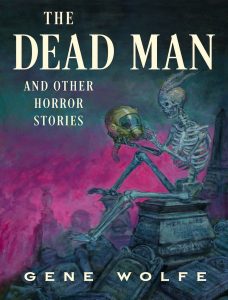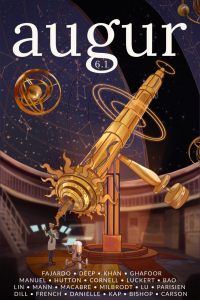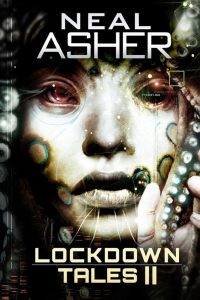Gary K. Wolfe Reviews The Dead Man and Other Horror Stories by Gene Wolfe
 The Dead Man and Other Horror Stories, Gene Wolfe (Subterranean 978-1-64524-120-1, $50.00, 400pp, hc) June 2023. Cover by Tom Kidd.
The Dead Man and Other Horror Stories, Gene Wolfe (Subterranean 978-1-64524-120-1, $50.00, 400pp, hc) June 2023. Cover by Tom Kidd.
Horror fiction might not be the first thing to come to mind when considering the impressive career of the late Gene Wolfe, despite some genuinely chilling moments in his most famous novels and a few oddities like An Evil Guest or The Sorcerer’s House, but The Dead Man and Other Horror Stories sets out to make a case for his skills in this arena. The problem is that, if we accept the common notion that horror fiction is characterized and even named by its effect on the reader – an idea going all the way back to Poe’s “unity of effect” – then horror does a pretty weak job of containing Wolfe’s imagination. Some of his most ardent advocates argue that he was always a literary rather than a genre writer, but that implies a distinction that Wolfe himself repeatedly rejected. The fact is that he knew perfectly well how and when to use horror, but to get back to that “unity of effect” problem, Wolfe’s best stories never try to do only one thing. While we’ll get our share of murderers, werewolves, vampires, ghouls, demons, “soul-suckers,” shapeshifting aliens, even a leopard woman, a treacherous computer, and one mean-ass crocodile, the stories they inhabit might be anything from fairy tale redactions to tone-perfect Victorian pastiches, deep-space SF, or Christian parable.
Not that Wolfe can’t go for that single effect when he wants to. In one of the handful of SF tales, “Talk of Mandrakes”, an exobiologist is offered a rare opportunity to examine an alien specimen that at first looks like a pile of sludge – until, in an ending worthy of an old EC comic, the scientist learns what the alien is really there for. The title story, “The Dead Man” (very nearly Wolfe’s first published story, from a 1965 men’s magazine), which involves that crocodile, also ends with a kind of shock-frame comics panel. The ironically titled “The Friendship Light” is a classic revenge tale involving resentful brothers-in-law, while “Mute” offers a terrifically unnerving setup, as a man named Billy randomly discovers a card on the street which turns out to be a religious saint’s card – but with his name and picture on it. As with several other tales, though, Wolfe frames Billy’s tale in layers of narrative wrapping paper – Billy has told the story to Augie, who is now telling it to the narrator. These framing devices – a manuscript found in a grave (“My Name Is Nancy Wood”), a journal and an audiotape log (“The Friendship Light”), a story passed on by an old friend (“Black Shoes”, “Redbeard”), a mysterious pamphlet found in a library (“Why I Was Hanged”) – not only remind us that these are told tales, but also introduce layers of possible narrative slippage. Wolfe’s narrators are famously tricky, and this just gives us more of them.
Probably the best-known stories are “The Hero as Werwolf”, a grim dystopian tale depicting a future in which humanity has divided itself into psi-powered Masters and cannibalistic lower classes, somewhat reminiscent of Eloi and Morlocks (but not really involving werewolves); “The Detective of Dreams”, a Chesterton-toned tale whose narrator is a brilliant detective who specializes in unpacking the dreams of others in a distinctly non-Freudian way; and “Redbeard”, a version of Bluebeard done up as a creepy serial-killer tale, again related secondhand. All three of these, along with “Bed and Breakfast” (whose title establishment is located near the entrance to Hell), were included in The Best of Gene Wolfe reissued by Tor a few years ago, but they’re the only stories that also appeared there; another half-dozen tales haven’t been previously collected at all. These include the genuinely haunting “Josh”, with begins with two kids moving to a remote house to live with their father, who seems to have disappeared, and then abruptly shifts into another sort of tale entirely, and then shifts again before the apocalyptic ending; “Prize Crew”, another straight-up SF horror tale involving an abandoned alien spaceship; “Innocent”, in which a werewolf indignantly denies accusations of pedophilia while cheerfully acknowledging that he’s eaten quite a few folks; “Uncaged”, a period piece set in Africa involving that leopard woman; “Why I Was Hanged”; and “Talk of Mandrakes”.
In addition to “Redbeard”, a few other stories offer hints of some of Wolfe’s literary forbears. “The Walking Sticks” reads like a pitch-perfect echo of an M.R. James ghost story, with the objects of the title seeming to take on a life of their own. “In the House of Gingerbread” is an even darker re-imagining of Hansel and Gretel. “The Death of Koshchei the Deathless” is based on a Russian folktale as retold by Andrew Lang, while “The Vampire Kiss”, vividly evoking the poverty of Victorian London through the eyes of a child, turns out to be literally Dickensian when we learn who the story is being told to, and who is passing it on to us. What nearly all the stories have in common, though, is Wolfe’s uncanny ability to draw us into even the most disorienting tales through prose that is precise and evocative, and through voices that range from the vernacular rhythms of good old boys to the measured cadences of Victorian gentlemen. The Dead Man and Other Horror Stories is the first posthumous collection of Wolfe’s writing (although a collection of horror rarities and reprints, The Wolfe at the Door, is due this fall), but it’s enough to remind us not so much what we’ve lost, as what we still have.
Gary K. Wolfe is Emeritus Professor of Humanities at Roosevelt University and a reviewer for Locus magazine since 1991. His reviews have been collected in Soundings (BSFA Award 2006; Hugo nominee), Bearings (Hugo nominee 2011), and Sightings (2011), and his Evaporating Genres: Essays on Fantastic Literature (Wesleyan) received the Locus Award in 2012. Earlier books include The Known and the Unknown: The Iconography of Science Fiction (Eaton Award, 1981), Harlan Ellison: The Edge of Forever (with Ellen Weil, 2002), and David Lindsay (1982). For the Library of America, he edited American Science Fiction: Nine Classic Novels of the 1950s in 2012, with a similar set for the 1960s forthcoming. He has received the Pilgrim Award from the Science Fiction Research Association, the Distinguished Scholarship Award from the International Association for the Fantastic in the Arts, and a Special World Fantasy Award for criticism. His 24-lecture series How Great Science Fiction Works appeared from The Great Courses in 2016. He has received six Hugo nominations, two for his reviews collections and four for The Coode Street Podcast, which he has co-hosted with Jonathan Strahan for more than 300 episodes. He lives in Chicago.
This review and more like it in the July 2023 issue of Locus.
 While you are here, please take a moment to support Locus with a one-time or recurring donation. We rely on reader donations to keep the magazine and site going, and would like to keep the site paywall free, but WE NEED YOUR FINANCIAL SUPPORT to continue quality coverage of the science fiction and fantasy field.
While you are here, please take a moment to support Locus with a one-time or recurring donation. We rely on reader donations to keep the magazine and site going, and would like to keep the site paywall free, but WE NEED YOUR FINANCIAL SUPPORT to continue quality coverage of the science fiction and fantasy field.
©Locus Magazine. Copyrighted material may not be republished without permission of LSFF.







